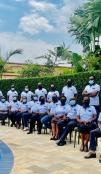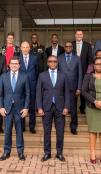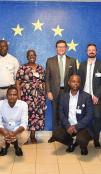#TeamEurope is contributing over €100 million to the Covid-19 response in Rwanda

#TeamEurope is contributing over €100 million to the Covid-19 response in Rwanda
The coronavirus pandemic is a global crisis with multiple impacts on all of us, beyond the immediate health threat. A strong European response in support of our partners worldwide is essential to put an end to the spread of the virus and to avoid spill over effects on peace and prosperity in our partner countries.
- Health Sector – #TeamEurope is directly supporting the government’s Covid-19 response plan with around €23m, including approx. € 18m of budget support loans from France, as well as grants of €2.8m from Germany & €1.5m from Belgium. Since the start of the crisis, a team of Belgian experts assists the national response team daily. Germany is supporting a mobile testing laboratory via EAC.
- Social Protection - The European Commission is giving a grant of €52m in addition to approx. €22m in loans from France to support the government in its efforts to provide food and cash assistance to the most vulnerable.
- Economic Response and Recovery- Germany is supporting a labour market survey on the Covid-19 impact and digital solutions for agriculture, food security and home-schooling, as well as a financial contribution to Local Competitiveness Funds. Belgium's agriculture program supports affected poultry farmers to contribute to early childhood nutrition programmes.
- Support to the Multilateral system – the EU institutions, Belgium, France, Germany, the Netherlands, Sweden and all other EU Member States are major contributors of core and flexible funding to WHO, UNICEF, UNFPA and other UN agencies in their fight against Covid-19 in Rwanda and globally.
- Civil Society Partnerships – The European Commission, Sweden, Germany, Belgium & France are supporting NGOs based in Rwanda to help local citizens affected by the socio-economic impacts of the COVID crisis and get them back on their feet.
- Research: SE is the largest contributor to the development of research and innovation capacity in Rwanda with more than €31,2m.
__________________________________________________________________________
. The EU and member states are also implementing and contributing to major global efforts to fight covid 19, such as:
In January 2020, the Commission launched an emergency call, through which €48.2 million were awarded to 18 research projects. The projects, which involve 151 teams from across Europe and beyond, have started working on improving preparedness and response to outbreaks, rapid diagnostic tests, new treatments and new vaccines. In addition, the Commission has made a €1.4 billion pledge to the Coronavirus Global Response initiative.
• Out of the IMF’s recent USD 50 billion emergency financing, USD 14 billion [or 28%] are imputable to the EU27. This is on top of ongoing European contributions and pledges to trust funds such as the Containment and Relief Trust, which provides eligible countries for debt service relief on IMF debt service.
· The World Bank is providing USD 14 billion in financing in response to COVID19. Europe is a significant shareholder of the World Bank and has contributed over 25% of the capital to its institutions.
· So far, the largest multilateral and regional development banks and financial institutions have announced or mobilised close to USD 88 billion in loans, grants, and bonds to support effort fighting the COVID‑19 pandemic. At least 22% of this global IFI effort is imputable to the EU27 (around USD 20 billion).
· The EU and its Member States’ financial contribution represents over 33% of the total voluntary contributions to the UN. Last year (2019) alone, the Commission committed EUR 3 billion to the UN, much of which will now be now mobilised and reoriented towards the COVID response.
· The EU has also pledged €475 million to the Global Fund to Fight Aids, Tuberculosis, Malaria for 2019-2022. The COVID-19 Response Mechanism authorizes funding of US$500 million and comes in addition to up to US$500 million in grant flexibilities.
· The EU contributes €200 million to (GAVI), for the current strategic period 2016-2020. In March, the Gavi Board agreed to make available up to US$ 200 million of its funding for health systems to help countries respond to the COVID-19 pandemic. Gavi is considering further extending its array of support beyond the immediate response to help countries recover more quickly.
· Gavi will provide US$ 29 million in urgent initial funding to 13 lower-income countries to support their response to COVID-19, helping them to protect health care workers with personal protective equipment (PPE), perform vital surveillance and training, and fund diagnostic tests, including in countries in the region such as Rwanda and DRC





